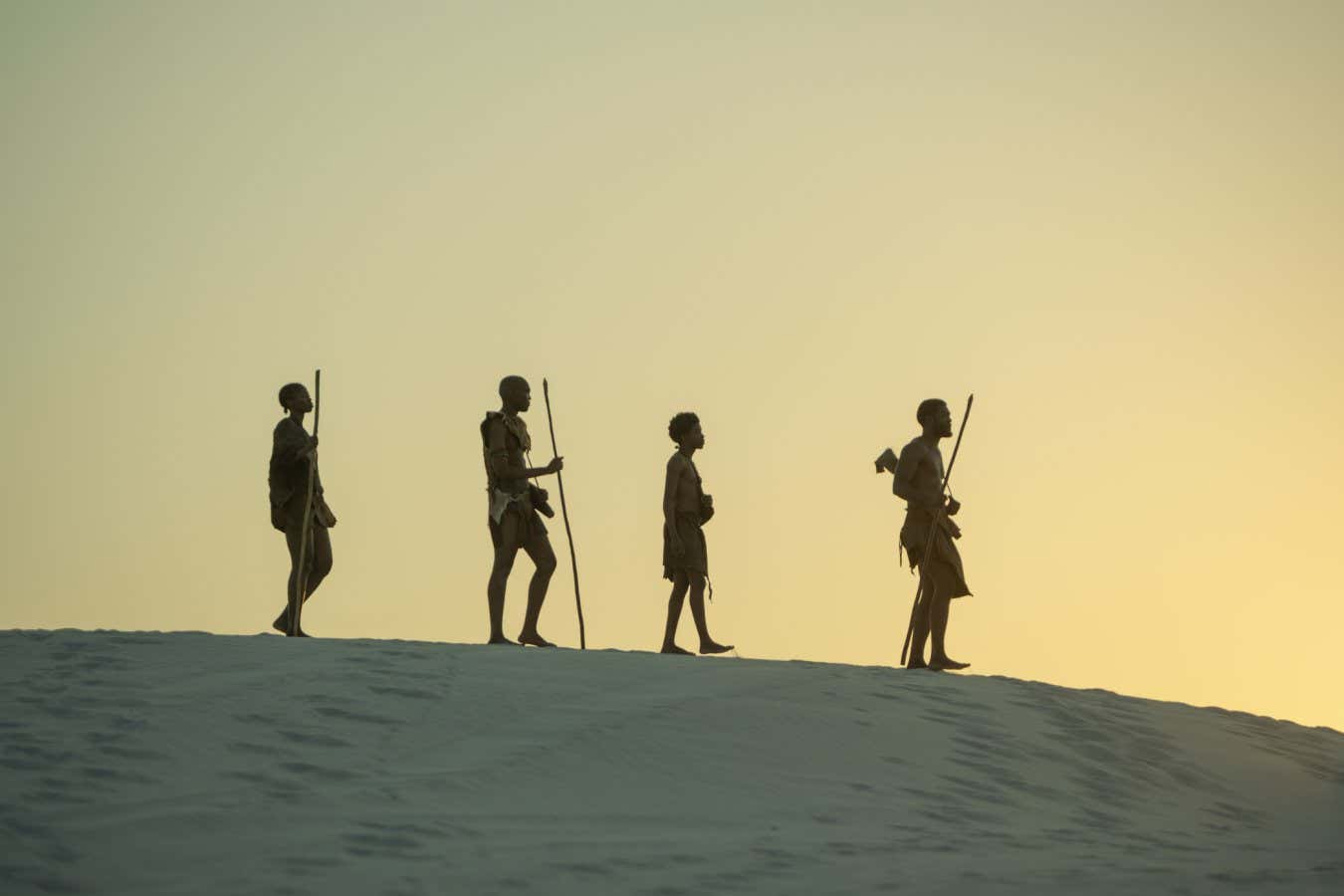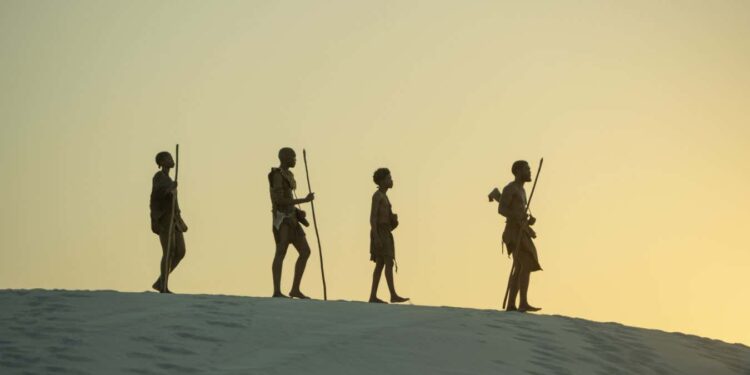
A dramatic reconstruction of early modern Homo sapiens in Africa
BBC/BBC Studios
Human
BBC iPlayer (UK); PBS, US (17 September)
In my experience, science documentaries tend to fall into two camps that are roughly akin to French and Italian cuisine. (Hear me out before you judge my analogy.) The first kind is more elaborate, using sophisticated techniques to achieve the very best experience – whether it is a well-crafted soufflé or the bells and whistles of animation and virtual reality. The second is simpler and tends to let the ingredients speak for themselves.
Both types of documentaries can yield fabulous, if different, results. Human, a five-part BBC series on the origins of our genus, Homo, is firmly of the latter sort. It combines a great story, beautiful visuals and a fantastic presenter in the palaeoanthropologist Ella Al-Shamahi, then leaves you to enjoy a hearty 6-million-year journey through humanity’s past. No bells and whistles needed.
The first episode is framed by a thorny question: when, exactly, did our species emerge? And there are many possible answers, depending on your perspective. Was it 300,000 years ago, when humans with facial features similar to ours began to emerge? Was it when our skulls became gracile and globular (basically, thinner and more globe-shaped), as Al-Shamahi puts it – with the commensurate effects on brain power? Or, more romantically, was it when we gained our most extraordinary traits: the capacity for complex language, abstract thought and cooperation?
“
This series combines a great story, beautiful visuals and a fantastic presenter in Ella Al-Shamahi
“
It is a terrific episode, surpassed only by moments when the focus shifts to other, extinct human species. When Al-Shamahi travels to Indonesia, in episode 2, we meet Homo floresiensis, a 1-metre-tall hominin adapted to life on the island of Flores. The discovery of remains of these “hobbits” in Liang Bua cave 20 years ago rewrote our understanding of ancient human biology: their tiny brains belied their use of stone tools, and their long arms and short stature aren’t seen in any other human species.
Episode 3 charts the demise of Neanderthals, our most famous cousins, who were far more sophisticated than once thought. Having reached Europe and Asia before us, they were adapted to the colder climes, but this didn’t save them from extinction.
Throughout, Al-Shamahi introduces us to surprising discoveries from recent decades of palaeoanthropology (which you may have read about in New Scientist). For example, iridescent feathers from birds like red kites were particularly prized by Neanderthals, while perikymata – growth lines on tooth enamel that reveal age as surely as tree rings – suggest that H. sapiens had longer childhoods, perhaps so we could learn how to use our large brains.
In just five episodes, Human can’t possibly tell us everything we want to know. But it does make it clear that H. sapiens is a species of reaction. We have been moulded in response to the climate, as it isolated us and forced us to adapt; to animals and plants that gave us sustenance; to other human species whom we lived alongside; and to each other, as nomadic groups shared skills, knowledge and DNA that let us survive long enough to start building cities.
This aspect of H. sapiens can get lost in narratives of us as the ultimate human, superior and spreading and conquering Earth. Human lets its counter-narrative speak for itself, with simple storytelling and a reverence for all our ancient relatives, not just our own species.
Tracing human evolution
Go behind the scenes of new BBC series Human with Ella Al-Shamahi newscientist.com/video
Bethan also recommends…
The fascinating (and dangerous) places scientists aren’t exploring
TED talk, 2019
In Ella Al-Shamahi ‘s intriguing and moving talk about her trip to the biodiverse Yemeni island of Socotra, she argued we are failing to do frontline science in places deemed too hostile for Western researchers. Take the discovery of a Neanderthal skeleton with serious disabilities in what is now Iraq, which meant he would have needed community support to survive. It is just one of the finds we are missing out on.
Bethan Ackerley is a subeditor at New Scientist. She loves sci-fi, sitcoms and anything spooky. Follow her on X @inkerley

New Scientist book club
Love reading? Come and join our friendly group of fellow book lovers. Every six weeks, we delve into an exciting new title, with members given free access to extracts from our books, articles from our authors and video interviews.
Topics:
Source link : https://www.newscientist.com/article/mg26735570-500-exploring-humanitys-ancient-origins-in-fantastic-new-bbc-documentary/?utm_campaign=RSS%7CNSNS&utm_source=NSNS&utm_medium=RSS&utm_content=home
Author :
Publish date : 2025-08-20 18:00:00
Copyright for syndicated content belongs to the linked Source.














